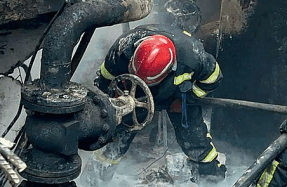Welcome to Britain. Now what?

IN LATE SEPTEMBER 2021, Firas, his wife and four-month-old son have been checked in to a smart business hotel in London. With green velvet sofas in the lobby and pink orchids at reception, it seems designed to bathe visitors in an atmosphere of corporate calm; in sharp contrast, Firas, 32, a former guard at the British embassy in Kabul, exudes a jangling, nervous sense of distress. Six weeks after a dramatic evacuation from Afghanistan, he remains so shaken that he wakes most nights at 3am and paces the hotel corridors in tears. “I can’t concentrate on my new life. I’m too worried about the people I’ve left behind,” he says, bent over a table, head in his hands.
A few miles away in another part of south London, Ali, 35, who spent eight years working as a programme and finance manager with the UK’s Department for International Development (DfID) in Afghanistan, is isolating inside one room of a quarantine hotel with his wife Zohrab, his nine-year-old daughter and his two sons, aged six and five. A Taliban death threat forced Ali to flee to London a year before his wife and children were evacuated in August 2021, and their recent reunion in this small room overlooking the Thames was incredibly emotional. “My kids were jumping all over me. I was just so relieved that they were safe,” Ali says. He found them dehydrated and hungry, still wearing the clothes they had left home in. The room is crowded, and the children are sleeping on the floor. They spend their days examining their new home out of the hotel window and finding enormous enjoyment in mimicking the unfamiliar words their father uses when he calls reception. “They find it so funny. They tease me, copying my voice, saying, ‘Good morning’ to each other.”
Meanwhile, in a shabby 1960s concrete hotel block in central London, Hussein, 36, his wife Hamida, their six children, his sister-in-law and her child are trying to make three adjacent rooms feel homely. With his first payment of refugee subsistence money, Hussein, a former translator for the British army in Afghanistan’s Helmand province, has bought a few small pot plants to balance on the window-sill. The children are still terrified by their recent escape. “We waited four days outside the airport. My children saw the Taliban firing guns. They had to be pulled to safety by US soldiers,” he says when we meet. “I want them to feel safe now. They’re spending all day lying on the bed, watching cartoons on television.”
Over two weeks last August, 15,000 people were airlifted from Afghanistan after it fell to the Taliban. The rescue was often chaotic. Desperate refugees were seen clinging on to the undercarriage of an overcrowded plane as it prepared to take off from Kabul; a bomb had gone off near the British evacuation headquarters, killing more than 100 people; it was clear that
You’re reading a preview, subscribe to read more.
Start your free 30 days



